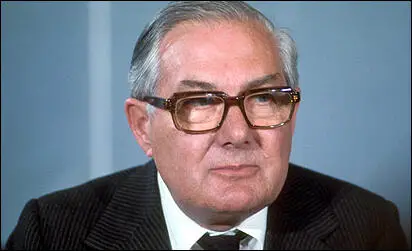James Callaghan
James Callaghan was born in Portsmouth in 1912. After being educated at Portsmouth Northern School, he joined the staff of the Inland Revenue. In 1931 he became a member of the Labour Party and began work as a trade union official.
Callaghan was selected as the parliamentary candidate for South Cardiff and was elected to the House of Commons in the 1945 General Election and held minor posts in the government of Clement Attlee.
When Hugh Gaitskell died in 1963, Callaghan was one of the main contenders for the party leadership. Callaghan, who represented the right-wing of the party, was defeated by Harold Wilson.
When the Labour Party was elected in the 1964 General Election, Callaghan became the Chancellor of the Exchequer. In this post he created a great deal of controversy by introducing corporation tax and selective employment tax. After a long struggle, Callaghan was forced to devalue the pound in November 1967.
Callaghan resigned from office but was recalled as Home Secretary in 1968. He held the post until the defeat of the Labour government in the 1970 General Election.
Edward Heath and his Conservative government came into conflict with the trade unions over his attempts to impose a prices and incomes policy. His attempts to legislate against unofficial strikes led to industrial disputes. In 1973 a miners' work-to-rule led to regular power cuts and the imposition of a three day week. Heath called a general election in 1974 on the issue of "who rules". He failed to get a majority and Harold Wilson and the Labour Party were returned to power.
Wilson appointed Callaghan as his foreign secretary. In this post he had responsibility for renegotiating Britain's terms of membership of the European Economic Community (ECC). in 1975 Callaghan was demoted to the position of minister of overseas development.

Now aged 63, political commentators thought Callaghan's political career was coming to an end. However, when Harold Wilson resigned in 1976, Callaghan surprisingly defeated Roy Jenkins and Michael Foot for the leadership of the Labour Party.
The following year Callaghan, and his Chancellor of the Exchequer, Denis Healey, controversially began imposing tight monetary controls. This included deep cuts in public spending on education and health. Critics claimed that this laid the foundations of what became known as monetarism. In 1978 these public spending cuts led to a wave of strikes (winter of discontent) and the Labour Party was easily defeated in the 1979 General Election.
Margaret Thatcher became the new prime minister and Callaghan was leader of the opposition until he resigned in 1980. Callaghan was made a life peer in 1987. His autobiography, Time and Chance, was published in 1987.
James Callaghan died on 26th March, 2005.
Primary Sources
(1) Denis Healey, The Time of My Life (1989)
Nowadays exchange rates can swing to and fro continually by amount greater than that, without attracting much attention outside the City columns of the newspapers. It may be difficult to understand how great a political humiliation this devaluation appeared at the time - above all to Wilson and his Chancellor, Jim Callaghan, who felt he must resign over it. Callaghan's personal distress was increased by careless answer he gave to a backbencher's question two days before the formal devaluation, which cost Britain several hundred million pounds.
Wilson himself regarded the sanctity of sterling as so absolute that he allowed Cabinet to discuss the issue only once, on July 19th, 1966; and he refused to circulate the minutes of that meeting, even to the Cabinet ministers who attended it. Thereafter he vetoed all attempts to discuss-the exchange rate in Cabinet, or even in any of the Cabinet committees on economic affairs. After the 1966 election Wilson had set up a small committee of key ministers to consider the major issues of economic policy - SEP; but every time we tried to raise the subject of devaluation, it was evaded. Michael Stewart, Dick Crossman and I soon joined a lobby for devaluation led by Roy Jenkins, Tony Crosland and George Brown, who had forced the abortive Cabinet meeting on devaluation in 1966. But Wilson continued to veto any formal discussion of the matter until the last moment, when he had already agreed with Callaghan that devaluation was inevitable. It was not until four days before the date fixed for the change in parity, that he set up a small group of ministers to supervise the details; he made me a member, I suspect, only because he wanted to commit me to yet another cut in defence spending as part of the accompanying economic measures.
(2) Harold Wilson, Memoirs: The Making of a Prime Minister, 1916-64 (1986)
Jim Callaghan I felt I could handle. He was a substantial figure in the Party, with strong trade union support, and always a potential rival. But I knew more about the Treasury and the economy than he did and the Prime Minister is also First Lord of the Treasury and holds the whip hand.

